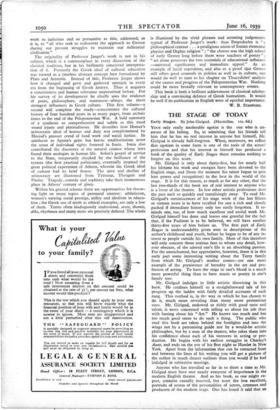THE HUMANISM OF HELLAS
Paideia : the Ideals of Greek Culture. By Werner Jaeger. Translated by Gilbert Highet. (Basil Blackwell. 155.)
A WIDE circulation of this book would do a valuable service to classical studies, especially now when their idealism and humanism are so gravely endangered from within by over- attention to detail and from without by the materialistic interpretation of history. Much more than a contribution to knowledge, this is a work of profound understanding. The original German version has been highly esteemed by scholars since its appearance in 1933, but it was unlikely to attract the wide audience that it deserved in Rnekh-speaking countries. Professor Highet's translation is fluent and versa- tile. The result is an interpretation of Greek culture which no one who cherishes the classical tradition can afford to ignore. Although Professor Jaeger's intention is not propa- gandist or apologetic, he succeeds better than any deliberate apologist could in reasserting how inevitably Western civilisa- tion is still, in his own term, Hellenocentric.
His math theme is the shaping of Greek character. This becomes a study of capital importance if it is conceded that "what we truly call civilisation—the deliberate pursuit of an ideal—does not begin until Greece." By this criterion of conscious striving after a cultural pattern of charactertacl behaviour, Professor Jaeger excludes all other ancient peoiles from claim to culture in the true sense. Egyptians, Baby- lonians, Hebrews never transcended in their educational achievements the conditions and .necessities of their environ- ment. The Greeks first, by their unique idealism, evolved a conception of human life superior to time and place, and thus universally valid. They were the first to show how mind could control physical powers. Only a relapse to barbarism can entirely frustrate this imperishable heritage of Greece. The imminent danger of such a relapse gives cogency to a
work so judicious and so persuasive as this, addressed, as it is, to " all who seek to rediscover the approach to Greece during our present struggles to maintain our millennial civilisation."
The originality of Professor Jaeger's work is not in his subject, which is a commonplace in every discussion of the classical tradition, but in his brilliantly conceived interpreta- tion of it. Formerly the Greek ideal of cultural education was viewed as a timeless abstract concept best formulated by Plato and Aristotle. Instead of this, Professor Jaeger shows how it changed and grew and gathered strength in every era from the beginning of Greek history. Thus it acquires a concreteness and human relevance unperceived before. For his survey of its development he chiefly uses the evidence of poets, philosophers, and statesmen—always the three strongest influences in Greek culture. This first volume—a second will complete the study—concentrates the cultural history of four hundred years in as many pages, from archaic times to the end of the Peloponnesian War. A bald summary of a synthesis so comprehensive and subtle as this must sound jejune and platitudinous. He describes how Homer's aristocratic ideal of honour and duty was complemented by Hesiod's peasant creed of hard work and social justice. In antithesis to Sparta's grim but heroic totalitarianism arose the sense of individual rights fostered in Ionia. Ionia also contributed the discovery of the natural cosmos whose laws found their analogies in human life. Solon's gospel of service to the State, temporarily checked by the brilliance of the tyrants (the first practical politicians), eventually inspired the great political experiment of Athens, wherein the Greek ideal of culture had its brief flower. The apex and decline of aristocracy are illustrated from Tyrtaeus, Theognis and Pindar. Tragedy, comedy and sophistry take their momentous place in Athens' century of glory.
Within his general scheme there are opportunities for throw- ing light on many topics of perennial interest : athleticism, women's varying social prestige, utility and idealism in educa- tion ; the Greek use of myth as ethical examples, are only a few of them. Terms often inadequately understood, arete, themis, dike, rhythmos and many more are precisely defined. The whole
is illumined by the vivid phrases and arresting judgements typical of Professor Jaeger's work : thus Empedocles is " a philosophical centaur . . . a prodigious union of Ionian elemental physics and Orphic religion " ; " the chorus was the high school of early Greece long before there were teachers of poetry " ; " art alone possesses the two essentials of educational influence —universal significance and immediate appeal." As an example of lucid exposition, and also as a proof that Greece still offers good counsels in politics as well as in culture, one would do well to turn to his chapter on Thucydides' analysis of the causes and progress of the Peloponnesian War. Nothing could be more brutally relevant to contemporary events.
This book is both a brilliant achievement of classical scholar- ship and a convincing defence of Greek humanism. It would be well if its publication in English were of epochal importance.
W. B. STANFORD.























































 Previous page
Previous page